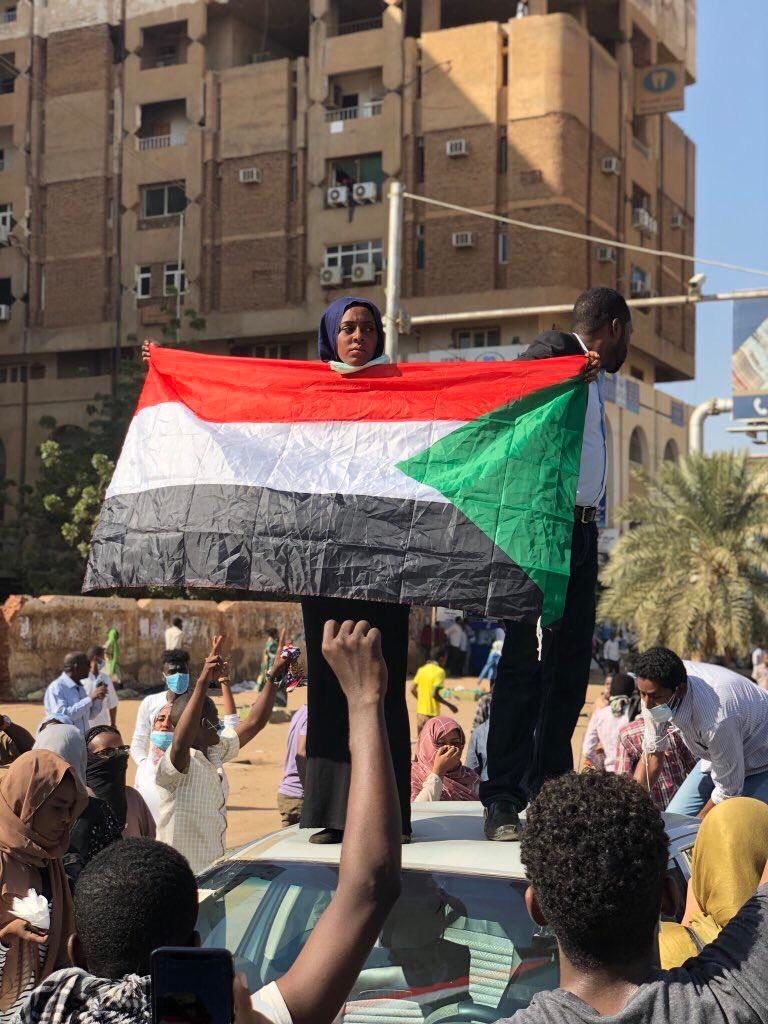Hala M.E. Abushama, MSc Development Economics
On 19 December 2018, peaceful demonstrations broke out through the streets of Atbara, in the Republic of Sudan. Bread prices tripled in Atbara overnight, after months of struggle with long queues to purchase bread and petrol as well as to obtain cash. This spark ignited a fire within Sudanese citizens to commence their fight for change.
Sudan’s youth-led revolution, for the most part, organized on social networking platforms, began in December 2018, starting in Atbara and spreading to all other states within the country. On December 25, Khartoum’s streets flooded with peaceful protests and it became clear they appealed to many strata of the country’s social fabric including women, men, and children.
The movement rapidly shifted from protesting the alarming deterioration in economic conditions to a solid demand of Al Bashir’s removal from office. “You arrogant racist, the whole nation is Darfur!”, goes one of the many chants that filled the streets of Khartoum and several other big cities during the marches in solidarity with Darfurian and western Sudanese citizens. Darfurians have faced decades of suppression, racism and discrimination, for example when Al Bashir’s forces coerced a handful of men from western Sudanese states into falsely admitting that they committed illegal acts on national television. Events such as this triggered anger within Sudanese citizens and inspired an incredible sense of inter-ethnic unity nationwide for the first time ever.
Al Bashir’s National Security forces responded to peaceful demonstrators with violence, they used the intimidation tactics of lashing protesters, firing tear-gas and live ammunition. Hundreds of detainees have been imprisoned for weeks, while many activists remain detained. Others, when bailed-out, returned to the streets the next morning. Dozens of young Sudanese men and children have died from gunshots to the head and chest, as reported by the Al Arabiya news agency. Such atrocities went a step further as martyrs’ families were only given the corpses for burial if they signed a death report denying the true cause of death.
Amidst such escalating developments, the Sudanese Professionals Association (SPA), in the span of a few weeks became the leading power of the revolution. An informal opposition group, whose members mostly remain anonymous for safety reasons, SPA formed in 2013 but has only been active as of August 2018. It is a freedom and peace-driven entity focused on giving people hope to spur change by championing a single goal: to remove Al Bashir’s repressive regime, that is guilty of crimes against humanity in both Sudan and South Sudan.
The SPA has been providing continuous announcements of demonstration locations and timings to which thousands of Sudanese people have responded by attending and chanting “Just Fall… That’s All..”, a statement that embodies the true meaning of unity within an ethnically and religiously diverse nation.
Sudanese women’s participation in marches made an ostensible statement against sexism, patriarchy and discrimination
In Sudan, the Islamic Sharia Law is the legal code that the National Congress Party claims it rules by, which it uses as a means to justify its degrading, racist and sexist acts towards the people. Women have been the most oppressed group in society for the past six decades but since December 2018, things took a turn. Sudanese women’s participation in marches made an ostensible statement against sexism, patriarchy and discrimination, and has proved how pivotal their role is within society. Women have become leading forces in peaceful marches across Sudan and unapologetically reject the norms that degrade women’s participation in any possible ‘hazardous’ act. Women in Sudan have finally unleashed their power by standing alongside male citizens, who are also beaten by regime apparatus, detained, and abused.
After more than two months of growing the movement has led to several forms of resistance emerging across the country: journalists’ resignations; strikes in private sector organizations, schools and hospitals. Artists in Sudan have grasped the opportunity to express their resistance in creative forms: music, poetry and graffiti are filling the streets of Khartoum and the hearts of millions of Sudanese people. Though it is still not clear if this will be enough to overthrow the government.

